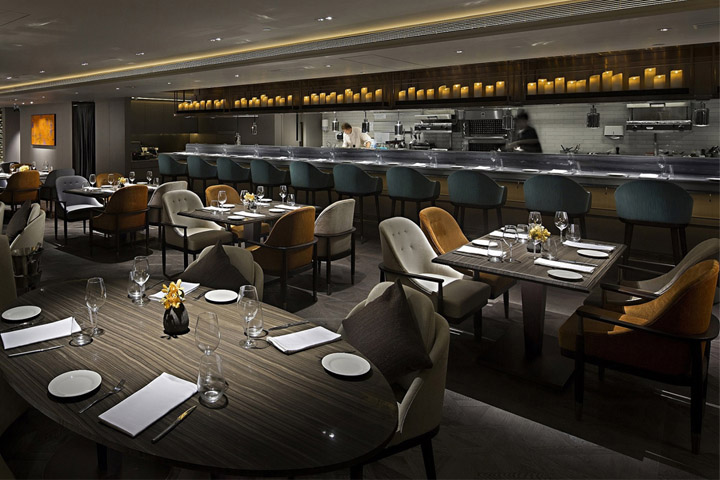His desire? To discover a new culinary frontier that the Far East promises. And discovered it, he did. Since then, he’s gone on to work for L'Atelier de Joël Robuchon and opened his own restaurant in 2014 named Seasons which went on to receive a star a year later.
“French recipes are combined with some Asian influences and the chef’s own ideas to create dishes that are full of verve and originality,” wrote the inspectors in the 2017 edition of Hong Kong’s MICHELIN guide.
Think along the lines of dishes like their langoustine risotto where plump masala butter-glazed New Zealand langoustines sit on a bed of black risotto made of Venere verboten rice – a variety that’s historically only available to the Chinese emperor.
The 37-year-old is by no means new to the inspection process nor the guide itself. After all, he grew up in Alsace, France and worked in a list of illustrious restaurants from the three-starred Pierre Gagnaire in Paris to La Pyramide in Vienne.
We get him to share with us more.

If I have to remember my strongest impressions will be first, Eric Briffard at the Hotel Vernet in Paris for his hard discipline and techniques. Second choice will be “La Pyramide” in Vienne for the French gastronomic heritage, traditions and establishment history.
What to you is the soul of French cuisine?
In my opinion, the soul of French gastronomy is built on a set of values including “terroirs”, traditions and “art de vivre”. Classic traditional dishes are the structure of a menu and also help to ensure the long term existence of French heritage and knowledge. French cuisine is also creativity, new ideas, new inventions, very important to express our own culinary vision and contribute to bring French cuisine over new horizons.
What’s your culinary style and its essential elements?
The menu is built upon three different layers which each bring structure to the restaurant’s concept without losing the food’s simplicity. Basically, we focus on innovation, creating the classics and also making sure there’s personal creation.

My inspiration comes from the seasonal transitions, from spring blooming, summer festival, autumn harvest to winter feast. Every aspect of the restaurant, from its interior design to the composition, ingredients and style of dishes is a love letter to one of the four seasons. Guests are invited to immerse in a romantic journey through the tastes, aroma and colours of a French year – plate by plate.
Let's talk about your restaurant. Why did you decide to open Seasons?
Opening a restaurant is every chef’s ultimate goal. In 2009, I came to Hong Kong to discover a new culinary frontier, the experiences in the East has made me re-think and re-interpret classical French cuisine. This thinking continues during my time with the Hong Kong Mandarin Oriental’s Pierre Restaurant and L’ Atelier de Joël Robuchon. So years of experiences and especially leading the two fine dining establishments to 2 and 3 Michelin Stars respectively in 2010 and 2012, I believe it is time for me to take a further step on achieving my goal - Seasons by Olivier Elzer is where my creativity and culinary passion can continue to flourish.
What are the challenges of running a restaurant in HK?
Hong Kong's F&B industry is very competitive but quality consistency is the key. In order to maintain guests' loyalty, we need to keep the quality at its best and reduce turnover rate. We also refresh our menus very frequently to attract new customers and monitor restaurant costs with precision to provide better productivity.

For me, French cuisine should not be sufficient to its own heritage. To be opened to the world is a challenge to transmit our culture, knowledge but also to trend for a new vision. Today, my philosophy is based on our strong French gastronomic heritage twisted with Asian influences and my menu is good example.
What advice do you have for young chefs?
I won’t say anything new but just the truth. If you aspire to be a chef you have to be passionate by your job. It is not even possible to think being a chef just for pleasure, it requires a lot of dedication, time, sacrifices and perseverance.
What will be your next move?
A concrete project is in development; in a short period of time, I will be able to give more details about it. Stay tuned!
Recommended reading: View all chef stories here











_THUMB_363_X_484.JPG)


